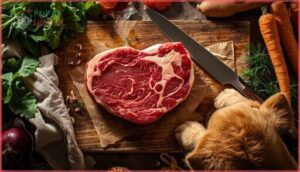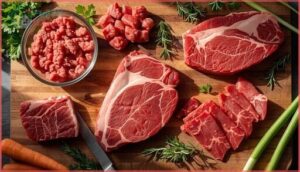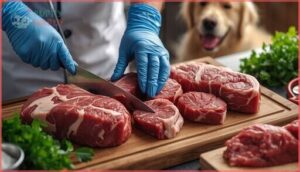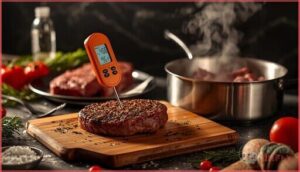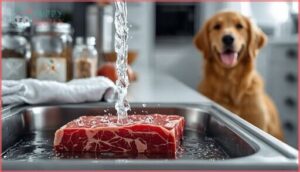This site is supported by our readers. We may earn a commission, at no cost to you, if you purchase through links.
Your dog’s eyes light up when you’re grilling steak, but should you share that juicy piece of beef? Many dog owners wonder if beef is a safe protein choice for their furry companions. The good news: plain, cooked beef can be a nutritious addition to your dog’s diet when prepared correctly.
Beef provides complete protein, essential amino acids, and key nutrients like iron and B vitamins that support your dog’s muscle development and immune function.
However, not all beef is created equal for canine consumption. Fatty cuts, seasoned meats, and certain preparation methods can turn this protein powerhouse into a health hazard. Understanding which types of beef are safe, proper cooking techniques, and appropriate portion sizes helps you make informed decisions about including beef in your dog’s meals.
Table Of Contents
- Key Takeaways
- Can Dogs Eat Beef Safely?
- Nutritional Benefits of Beef for Dogs
- Different Types of Beef Dogs Can Eat
- Types of Beef Dogs Should Avoid
- How to Prepare Beef for Your Dog
- How Much Beef Can Dogs Eat?
- Health Risks of Feeding Beef to Dogs
- Can Puppies and Special Breeds Eat Beef?
- Ways to Include Beef in Your Dog’s Diet
- What to Do if Your Dog Eats Harmful Beef
- Frequently Asked Questions (FAQs)
- Can I feed my dog cooked beef?
- What kind of beef can a dog eat?
- Can dogs eat raw beef?
- Is beef liver safe for dogs?
- How much beef can I feed my dog?
- Can dogs eat beef bones?
- What are the benefits of feeding beef to dogs?
- Can dogs with kidney disease eat beef?
- Is grass-fed beef better for dogs?
- Can dogs eat beef lung or tripe?
- Conclusion
Key Takeaways
- Plain, cooked lean beef provides complete protein, essential amino acids, iron, and B vitamins that support your dog’s muscle development and immune function when prepared without seasonings or excess fat.
- You should avoid feeding your dog seasoned beef, fatty cuts, cooked bones, raw meat, or preserved products like corned beef and jerky, as these can cause pancreatitis, bacterial infections, toxicity from garlic or onions, and choking hazards.
- Proper preparation requires cooking beef to 160°F for ground meat or 145°F for whole cuts, trimming all visible fat, removing seasonings, and serving portions that follow the 10% treat rule to prevent weight gain and digestive issues.
- Certain dogs—including puppies, breeds prone to bladder stones like Dalmatians and Yorkshire Terriers, and dogs with beef allergies or kidney disease—require special dietary considerations or veterinary approval before eating beef.
Can Dogs Eat Beef Safely?
Yes, dogs can eat beef safely when it’s prepared the right way. The key is understanding what makes beef safe versus risky for your pet.
Before serving beef to your dog, check out this guide on feeding pork to dogs to understand how different meats require different preparation methods.
Let’s break down the main safety factors you need to know before feeding beef to your dog.
Is Beef Safe for Dogs?
Yes, beef is safe for most dogs when you prepare it properly. Plain, cooked beef promotes canine health and wellness without posing beef toxicity risks. However, dog nutrition experts emphasize meat safety through proper handling and cooking.
You’ll want to verify your dog doesn’t have meat allergies before introducing beef, as some dogs react poorly. Pet food safety starts with understanding which preparations work best for your companion.
Owners should be aware of important guidelines such as avoiding to guarantee a balanced and safe diet.
Plain Vs. Seasoned Beef
Plain beef contains only the meat’s natural fat and muscle tissue, making it the safest choice for canine health and dog nutrition and diet. Seasoned beef introduces herbs, spices, and sodium that alter beef flavor profiles and seasoning effects—ingredients like garlic or onion powder threaten your dog’s wellness.
Cooking techniques matter: plain preparations preserve nutrient retention while protecting meat safety. Your dog’s digestive system tolerates unseasoned beef best, so skip those tempting spice blends.
Cooked Vs. Raw Beef Safety
Cooking methods transform beef safety and handling for your dog. Cooked beef reaches internal temperatures that eliminate Salmonella and E. coli—bacterial risks that threaten both canine and human health.
Raw beef may harbor pathogens throughout ground meat, increasing food poisoning chances. Dogs with digestion issues tolerate cooked beef better since heat breaks down tough connective tissue, easing nutrient absorption and reducing stomach upset.
In some cases, probiotic characteristics of raw beef have been considered in discussions about dietary choices for both humans and pets.
Nutritional Benefits of Beef for Dogs
Beef brings more to your dog’s bowl than just a savory taste. When prepared properly, it delivers a powerful nutritional punch that aids everything from muscle development to immune function.
Let’s look at the key nutrients that make beef a valuable protein source for your canine companion.
Protein and Amino Acids
Beef delivers complete protein packed with all nine essential amino acids your dog’s body can’t produce on its own. These building blocks drive muscle growth, tissue repair, and enzyme production that keeps your pup thriving.
Lean beef promotes protein synthesis efficiently, helping your dog maintain strong muscles and steady energy throughout the day.
Essential Vitamins and Minerals
Your dog’s canine nutrition depends on more than just protein—beef provides essential vitamins and minerals that support everything from immune function to bone strength. Iron carries oxygen through your dog’s bloodstream, while phosphorus teams up with calcium to build sturdy bones and teeth. Selenium acts as a powerful antioxidant, protecting cells from damage.
This nutrient absorption creates the foundation for a balanced canine diet without relying solely on dietary supplements.
B Vitamins and Zinc Content
The B complex in beef—especially Vitamin B12—powers your dog’s energy metabolism while supporting nerve and brain health. A three-ounce serving delivers roughly 1.1 micrograms of B12 plus meaningful amounts of niacin and riboflavin.
Zinc benefits extend to immune function, wound healing, and skin health, with lean beef providing about 5–6 milligrams per serving to maintain proper mineral balance and nutrient absorption.
Different Types of Beef Dogs Can Eat
Not all beef is created equal regarding your dog’s bowl. Some cuts and preparations offer safe, nutrient-rich options that can boost your dog’s diet, while others should stay off the menu entirely.
Here’s a breakdown of the types of beef that get the green light from veterinary nutritionists.
Lean Ground Beef
When selecting ground beef for your dog, look for packages labeled 90/10 or higher to keep fat intake in check.
Lean ground beef offers substantial protein—about 23 grams per 4-ounce serving—along with essential B vitamins and zinc for immune support.
Always cook it thoroughly until no pink remains, skip all seasonings, and serve it plain to guarantee beef safety for dogs while maximizing canine nutrition benefits.
Cooked Steak
Steak can be a healthy protein option when you prepare it properly for your dog’s safety. Choose lean beef cuts like sirloin or tenderloin, cook to at least 145°F for meat safety, and trim visible fat to support dog digestion.
- Remove all seasonings, garlic, and sauces before serving
- Cut into small, bite-sized pieces to prevent choking
- Serve plain cooked beef at medium doneness
- Never offer cooked bones, which splinter easily
Monitor portion sizes to maintain steak nutrition benefits without overfeeding.
Beef Organs (Heart and Liver)
Organ meats pack impressive beef heart benefits and liver nutrition your dog can’t get from muscle meat alone. Beef liver delivers highly bioavailable iron, vitamin A, B12, and zinc for immune support and enzyme function. Heart provides lean protein with coenzyme Q10 for canine heart health and cellular energy.
Cook organs thoroughly, serve 1-2 ounces weekly for medium dogs, and avoid overfeeding to prevent vitamin A toxicity affecting pet health.
Beef Broth
Homemade beef broth benefits your dog through joint health support from dissolved collagen and amino acids that aid digestion. Simmer bones for 6 to 24 hours, then strain and refrigerate.
Choose low sodium options or make your own—store-bought varieties contain 500 to 900 milligrams of sodium per cup.
This gut support powerhouse rehydrates while delivering essential minerals for ideal pet nutrition.
Types of Beef Dogs Should Avoid
Not all beef is safe for your dog, even if it seems like a simple protein source. Certain preparations contain hidden dangers like excessive salt, toxic seasonings, or sharp bone fragments that can harm your pet.
Here are the types of beef you should keep away from your dog’s bowl.
Corned Beef
Corned beef risks make this cured meat a poor choice for your dog’s diet. The beef curing process involves heavy salt and spices that strain canine kidneys and cardiovascular systems.
Canned beef safety concerns arise from:
- Excessive sodium content (up to 800mg per serving)
- Added preservatives that dogs can’t process efficiently
- High fat from brisket cuts promoting pancreatitis
Skip corned beef entirely—your dog’s health depends on plain, unseasoned options instead.
Fried or Fatty Beef
Fried beef dangers extend beyond salt to include excessive fat content—often reaching 20 to 40 percent depending on cut and cooking method. When you fry beef, oils render and increase total fat by 5 to 15 percent per serving, raising fatty acid risks that trigger pancreatitis in dogs.
Skip ribeye, brisket, and pan-fried ground beef to protect your dog’s pancreas and digestive health.
Seasoned or Preserved Beef
Beyond frying, marinated and cured beef pose serious seasoning risks to your dog. Store-bought marinades often contain garlic or onion—both toxic to dogs—while smoked beef and beef jerky introduce excess salt and nitrites that stress kidneys.
Even homemade beef broth seasoned with herbs can upset digestion. Stick to plain, unseasoned beef to safeguard your dog’s health and avoid unnecessary trips to the vet.
Beef Bones and Ribs
While plain beef is safe, beef bones and ribs are a different story. Cooked bones splinter easily, creating sharp fragments that can lodge in your dog’s throat or puncture the digestive tract. Even knuckle bones with dense cartilage pose choking hazards.
Never offer your dog:
- Splintering rib bones that break into sharp, jagged pieces
- Marrow bones small enough to trap around the jaw
- Vertebrae or flank bones that crumble under pressure
Save beef bones for making beef stock—not snacks.
How to Prepare Beef for Your Dog
Preparing beef the right way makes all the difference between a healthy meal and a potential health problem for your dog. The good news is that it doesn’t require any fancy techniques—just a few basic safety steps.
Here’s what you need to know to prepare beef that’s both safe and nutritious for your pet.
Choosing Lean Cuts
You’ll want to choose cuts with minimal fat marbling to keep your dog’s diet lean and healthy. Look for round, sirloin, or flank cuts, and opt for ground beef labeled 93% lean or higher. Select or Choice grades generally contain less fat than Prime.
Before cooking, trim any visible fat from beef cuts to further reduce fat content and support your dog’s nutritional needs.
Proper Cooking Temperature
Temperature control stands as your most reliable safeguard when preparing cooked beef for your dog. Ground beef must reach 160°F to guarantee it’s cooked thoroughly, while whole cuts like steaks need 145°F with a three-minute rest. You’ll need a meat thermometer to verify beef safety and handling—never rely on color alone.
Key food safety practices include:
- Insert the thermometer into the thickest part away from bone
- Cook lean beef uniformly, breaking ground meat into small pieces
- Avoid pink centers in ground beef when serving
- Use separate cutting boards to prevent cross-contamination
- Refrigerate leftovers within two hours of cooking methods completion
Removing Seasonings and Additives
Before offering any beef to your dog, you’ll need to strip away all seasonings and additives that compromise beef safety and handling. Rinse the meat under cold water to remove surface salt, then pat it dry with a clean towel.
Never add garlic, onion powder, or preservatives during beef preparation—these ingredients threaten dog health even in trace amounts, so stick with additive-free, clean cooking methods using only lean beef.
Safe Storage Guidelines
You’ll protect your dog from food poisoning and prevention issues by refrigerating cooked beef within two hours at 40°F or lower. Use airtight storage containers on the bottom shelf to prevent cross-contamination and maintain beef safety and handling standards.
Label each portion with the date, and follow refrigeration tips like discarding beef after three to five days. For longer freezer safety, store portions at 0°F.
How Much Beef Can Dogs Eat?
Your dog’s size and weight directly determine how much beef they can safely eat without tipping the scale toward health problems. You’ll need clear portion guidelines to keep their diet balanced and nutritious.
Let’s break down the right amounts based on your dog’s size, daily limits, and the treat rule every pet owner should follow.
Portion Sizes by Dog Size
Your dog’s size shapes how much beef fits into healthy meal planning. Small breeds under 20 pounds usually need 1/4 to 1/3 cup of cooked beef per meal when following dog size guidelines and calorie calculations.
Medium dogs often receive 1/2 to 1 cup, while large breeds may get 1 to 2 cups per meal as part of balanced dog nutrition and diet strategies that support overall dog health.
Daily Feeding Guidelines
Most dogs thrive on two meals per day to maintain steady energy and support digestion. Consistent feeding schedules and portion control help you balance nutrients across breakfast and dinner, preventing overfeeding while supporting your dog’s nutrition and health through thoughtful meal planning.
When you add lean ground beef as a protein source, replace a portion of your dog’s regular food to keep calorie management on track.
The 10% Treat Rule
Treat portion control keeps your dog’s nutrition in balance. All beef snacks and dog food toppers count toward the ten percent rule, meaning treats should make up only 10% of daily calories.
For healthy snacking, subtract treat calories from your dog’s regular meals to maintain calorie management and prevent weight gain through balanced dieting and smart pet care.
Health Risks of Feeding Beef to Dogs
Beef offers real nutritional value for dogs, but it’s not without potential downsides. When fed improperly or in excessive amounts, beef can trigger several health problems ranging from digestive issues to more serious conditions. Understanding these risks helps you make informed decisions about including beef in your dog’s diet.
Weight Gain and Obesity
Excess caloric intake from beef can tip your dog’s energy balance toward fat accumulation, especially when portions aren’t carefully measured.
Even lean protein sources contribute calories that, without proper weight management, increase obesity risks over time.
Monitor your dog’s body condition and adjust portions to maintain healthy dog nutrition—because what you feed today shapes your dog’s long-term health and vitality tomorrow.
Pancreatitis From Excess Fat
High-fat beef triggers lipotoxicity effects in your dog’s pancreas, where free fatty acids from visceral fat accumulation directly damage pancreatic cells and exacerbate inflammation.
Obesity risks escalate pancreatic injury severity—dogs carrying excess weight face longer recovery times and potential organ failure. Monitor your dog’s diet closely, because fat metabolism problems don’t just threaten comfort; they can spark life-threatening pancreatitis requiring immediate veterinary care.
Excess weight in dogs worsens pancreatic injury and can turn fat metabolism issues into life-threatening pancreatitis requiring urgent veterinary care
Bladder Stones and High Purine
Beyond pancreatitis, beef’s high purine content poses another serious threat to kidney health. Purines break down into uric acid, which can crystallize in your dog’s urinary tract and form painful bladder stones. Here’s how to protect your pet:
- Limit organ meats and rich beef cuts that spike uric acid levels
- Monitor Dalmatians and breeds with genetic stone susceptibility closely
- Maintain hydration to dilute urine and prevent crystal formation
Stone prevention requires careful purine management and dietary restrictions customized to your dog’s individual risk factors.
Bacterial Contamination From Raw Beef
Raw beef carries dangerous pathogens like E. coli, Salmonella, and Listeria that threaten both you and your dog. These bacteria cause severe food poisoning with symptoms ranging from bloody diarrhea to life-threatening infections.
Always cook beef to 160°F internal temperature to eliminate bacterial risk. Proper beef handling and pathogen control protect your household from foodborne illnesses that raw diets can introduce.
Can Puppies and Special Breeds Eat Beef?
Not every dog can handle beef the same way. Puppies have different nutritional needs than adult dogs, and certain breeds face higher health risks when eating beef regularly.
Before adding beef to your dog’s meals, you need to know if your pet falls into a special category that requires extra caution.
Beef for Puppies
You can introduce beef to your puppy’s diet once they’re eating solid food, but preparation matters for canine development and puppy nutrition.
Always cook beef thoroughly to at least 165°F to kill bacteria—raw beef carries infection risks young immune systems can’t handle.
Serve plain, lean cuts like ground beef or sirloin in small, bite-sized pieces. Remove all fat, bones, and seasonings to safeguard pet care and safety during this critical growth phase.
Breeds Prone to Bladder Stones
Certain breeds face higher urinary health risks when eating beef due to purine content, which can trigger bladder stones. If your dog belongs to one of these breeds, diet management becomes essential for stone prevention and canine urology care.
- Dalmatians process purines differently, making them extremely vulnerable to urate stones
- Yorkshire Terriers commonly develop both struvite and calcium oxalate stones
- Miniature Schnauzers frequently show calcium oxalate stone formation
- Bichon Frises demonstrate high prevalence of recurrent bladder issues
Talk to your vet about adjusting your dog’s beef intake to protect their urinary health and animal welfare.
Dogs With Beef Allergies
Some dogs develop food allergies to beef, triggering canine skin issues like itching, rashes, or ear infections. You might also notice vomiting, diarrhea, or paw licking after meals.
Beef allergy tests and elimination diets help confirm food sensitivity. If your dog shows an allergic reaction, switch to dietary alternatives like novel proteins—venison, duck, or fish—under your vet’s guidance to manage food allergies effectively.
Ways to Include Beef in Your Dog’s Diet
Adding beef to your dog’s meals doesn’t have to be complicated. You can incorporate it in several practical ways that fit seamlessly into your feeding routine.
Here are the most effective methods to safely include beef in your dog’s diet.
As a Meal Topper
Adding beef as a meal topper transforms ordinary kibble into something your dog can’t resist. Small portions of cooked lean ground beef or steak cubes deliver high-quality protein sources—20 to 25 grams per 3-ounce serving—without artificial palatability factors.
Consider these beef toppers:
- Finely chopped lean beef mixed into dry dog food
- Beef broth drizzled over meals for nutrient additions
- Cubed steak combined with dog-friendly vegetables
These protein boosters improve animal nutrition and health while keeping your dog’s diet balanced.
In Homemade Dog Meals
Creating balanced homemade diet recipes with beef requires attention to canine dietetics. You’ll need to combine protein, carbohydrates, healthy fats, and vegetables for complete dog nutrition.
Cook lean ground beef to 160°F, drain excess fat, then mix with rice or potatoes and dog-safe vegetables. Avoid raw beef and seasonings.
Store beef meal prep portions in the refrigerator for 3–4 days or freeze for long-term homemade diet plans.
As Recovery Food
When your dog is bouncing back from surgery or injury, lean beef can be a smart addition to recovery meals. It delivers high-quality protein for tissue repair, plus iron and zinc to support healing.
Cook beef to 160°F without added fats, then pair it with rice and vegetables for balanced canine nutrition. Beef broth also helps with hydration during post-surgery care—just skip the heavy seasonings.
Beef-Based Dog Treats
Beyond mealtime, you can reward your dog with beef jerky or freeze-dried beef treats that skip artificial additives. Safest beef treats use single-ingredient formats—lean ground beef or bone broth bites work well for dogs with food allergies. Avoid corned beef and seasoned options that contain garlic or onions.
Always follow preparation tips like trimming fat and storing treats properly. When in doubt, veterinary guidance on beef safety and handling keeps treat time worry-free.
What to Do if Your Dog Eats Harmful Beef
Even when you’re careful, accidents happen—your dog might snag seasoned meat off the counter or find raw beef in the trash. Knowing how to respond quickly can prevent minor mishaps from turning into serious health emergencies.
Here’s what you need to watch for and when it’s time to call your veterinarian.
Signs of Adverse Reactions
Recognizing trouble early can make all the difference in protecting your dog’s digestive health and preventing foodborne illnesses. Watch for these key signs of food allergies and intolerance:
- Gastro Issues – Vomiting within 1 to 6 hours, diarrhea, or abdominal bloating signal intolerance or allergic responses.
- Skin Irritation – Hives, redness, or excessive itching indicate allergies.
- Respiratory Alerts – Wheezing or throat swelling require urgent care.
- Behavioral Changes – Lethargy, restlessness, or reluctance to move follow beef-induced discomfort.
If Your Dog Eats Seasoned Beef
If your dog sneaks seasoned beef, don’t panic—but act quickly. Remove any remaining beef immediately. Toxic ingredients like garlic and onion can trigger digestive issues within hours, while high salt increases thirst and urination.
Monitor for vomiting, diarrhea, or lethargy over the next 12 to 24 hours. When seasoning risks involve multiple toxic ingredients or large portions, contact your veterinarian for emergency care guidance.
If Your Dog Eats Raw Beef
Raw beef carries serious food safety hazards you can’t ignore. Bacterial contamination from Salmonella and E. coli leads to vomiting, diarrhea, and lethargy—and it doesn’t stop there.
Parasite infection spreads through your household when contaminated raw beef enters your dog’s system. Watch for symptoms of food poisoning over 24 to 48 hours, and contact your vet if anything seems off.
When to Contact Your Veterinarian
When should you pick up the phone? Contact your vet immediately if your dog shows Emergency Signs like persistent vomiting, bloody diarrhea, or collapse after eating harmful beef.
Urgent Care becomes critical when dehydration, seizures, or trouble breathing develop.
For suspected toxin exposure—garlic, onions, or spoiled meat—call Poison Control or seek Veterinary Guidance right away to prevent serious Dog Health Risks.
Frequently Asked Questions (FAQs)
Can I feed my dog cooked beef?
Yes, you can feed your dog cooked beef safely. Plain, thoroughly cooked lean beef without seasonings, onions, or garlic provides excellent protein and essential nutrients for most dogs when served in appropriate portions.
What kind of beef can a dog eat?
Your dog can safely eat lean ground beef, boneless steak like sirloin, and organ meats such as liver or heart—all thoroughly cooked, unseasoned, and trimmed of excess fat.
Can dogs eat raw beef?
While some owners follow raw diet trends, veterinarians caution that uncooked meat carries serious bacterial contamination risks including Salmonella and E. coli, which can trigger vomiting, diarrhea, and lethargy in dogs.
Is beef liver safe for dogs?
Beef liver delivers concentrated nutrients for canine wellness but requires careful portioning as a dog supplement.
When cooked properly, this organ meat aids red blood cell production—yet vitamin A overload remains a real risk without veterinary advice.
How much beef can I feed my dog?
Think of beef portions like filling a tank—too little and your dog runs on empty, too much and you risk overflow.
Ground beef serving sizes depend on your dog’s weight, following established canine diet plans and pet food guidelines for ideal dog nutrition and health.
Can dogs eat beef bones?
No. Cooked beef bones splinter easily and pose choking hazards. While large raw beef bones offer safer chewing under supervision, weight-bearing bones risk tooth fractures. Remove bones immediately after meat consumption to prevent bacterial exposure.
What are the benefits of feeding beef to dogs?
Your dog’s body thrives on beef’s complete amino acids, which fuel muscle repair and growth.
This protein powerhouse also delivers iron for oxygen transport, zinc for immune function, and B vitamins supporting energy metabolism and canine wellness.
Can dogs with kidney disease eat beef?
Most dogs with kidney disease shouldn’t eat beef without veterinary approval. Kidney-friendly diets generally limit beef to protect dog kidney health.
Lean, unseasoned portions may fit CKD nutrition tips if your vet customizes protein sources.
Is grass-fed beef better for dogs?
Grass-fed beef offers your dog higher omega-3 fatty acids, more vitamin E, and better zinc content than grain-fed options.
The leaner nutrient profile and antioxidant properties support immune function and coat health effectively.
Can dogs eat beef lung or tripe?
Yes, both beef lung and tripe offer nutritional benefits like protein, vitamins, and digestive enzymes.
Cook lung thoroughly to eliminate bacteria, but feed green tripe raw to preserve probiotics that support canine digestion and gut health.
Conclusion
Your dog’s next meal doesn’t need to be a guessing game. When prepared correctly—lean, plain, and fully cooked—beef delivers protein-packed nutrition your dog needs to thrive.
Skip the seasonings, avoid fatty cuts, and follow proper portion guidelines to keep your companion healthy.
Whether you’re adding it as a topper or incorporating it into homemade meals, understanding can dogs eat beef safely means you’re making choices backed by veterinary science, not just instinct.
- https://avmajournals.avma.org/view/journals/javma/243/11/javma.243.11.1549.xml
- https://www.fsis.usda.gov/food-safety/safe-food-handling-and-preparation/food-safety-basics/safe-temperature-chart
- https://nativepet.com/blogs/health/can-dogs-eat-ground-beef?srsltid=AfmBOop9Ata7ZeP4gUjBykv-BovJLa9tzpGBVleCrPu-T8t3mVm6HK8_
- https://pangovet.com/?utm_source=dogster&utm_medium=article&utm_campaign=dog_eat_drink&utm_content=can-dogs-eat-ground-beef
- https://foods.fatsecret.com/calories-nutrition/usda/ground-beef-(95%25-lean---5%25-fat)?portionid=63122&portionamount=100.000



